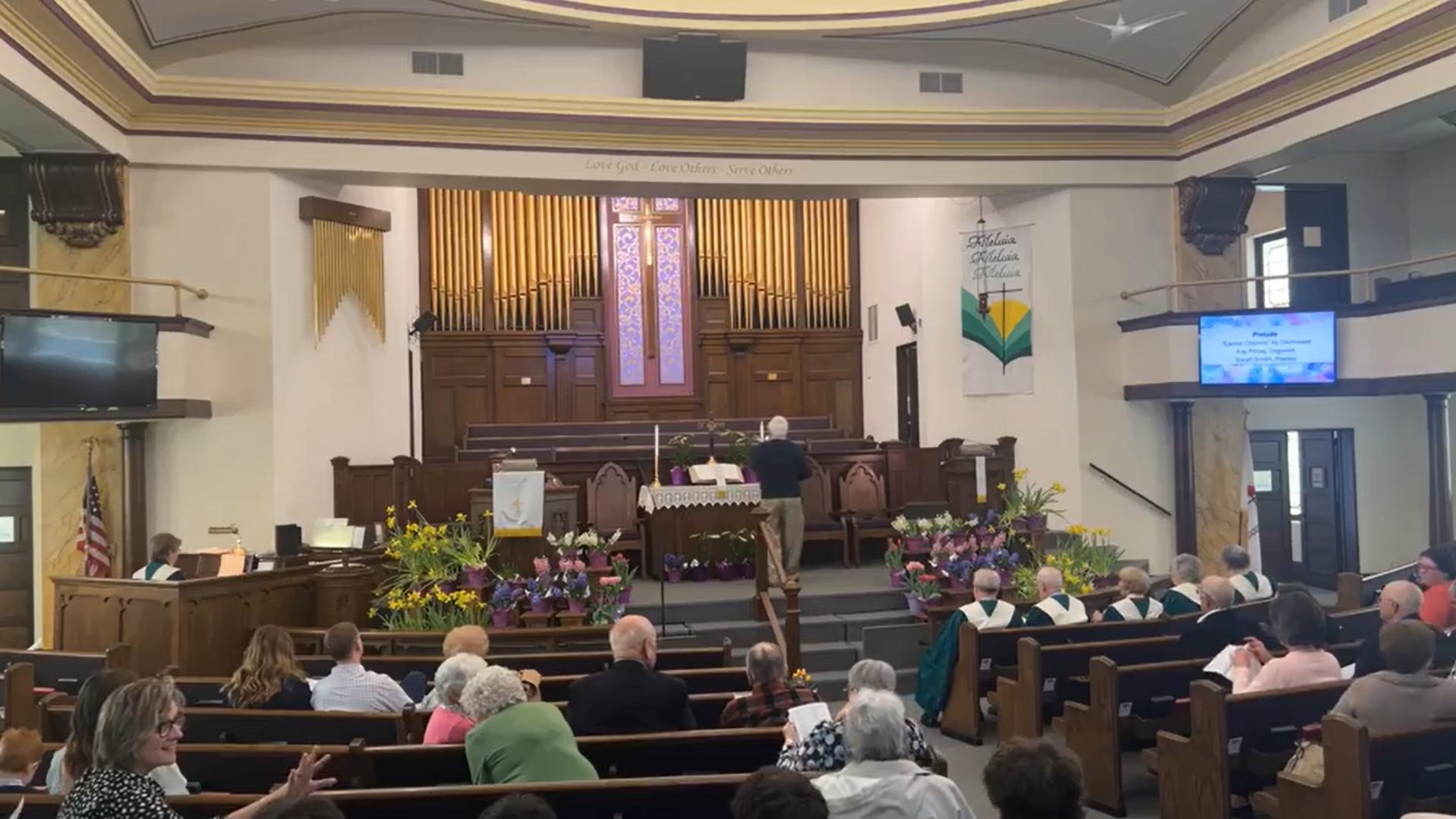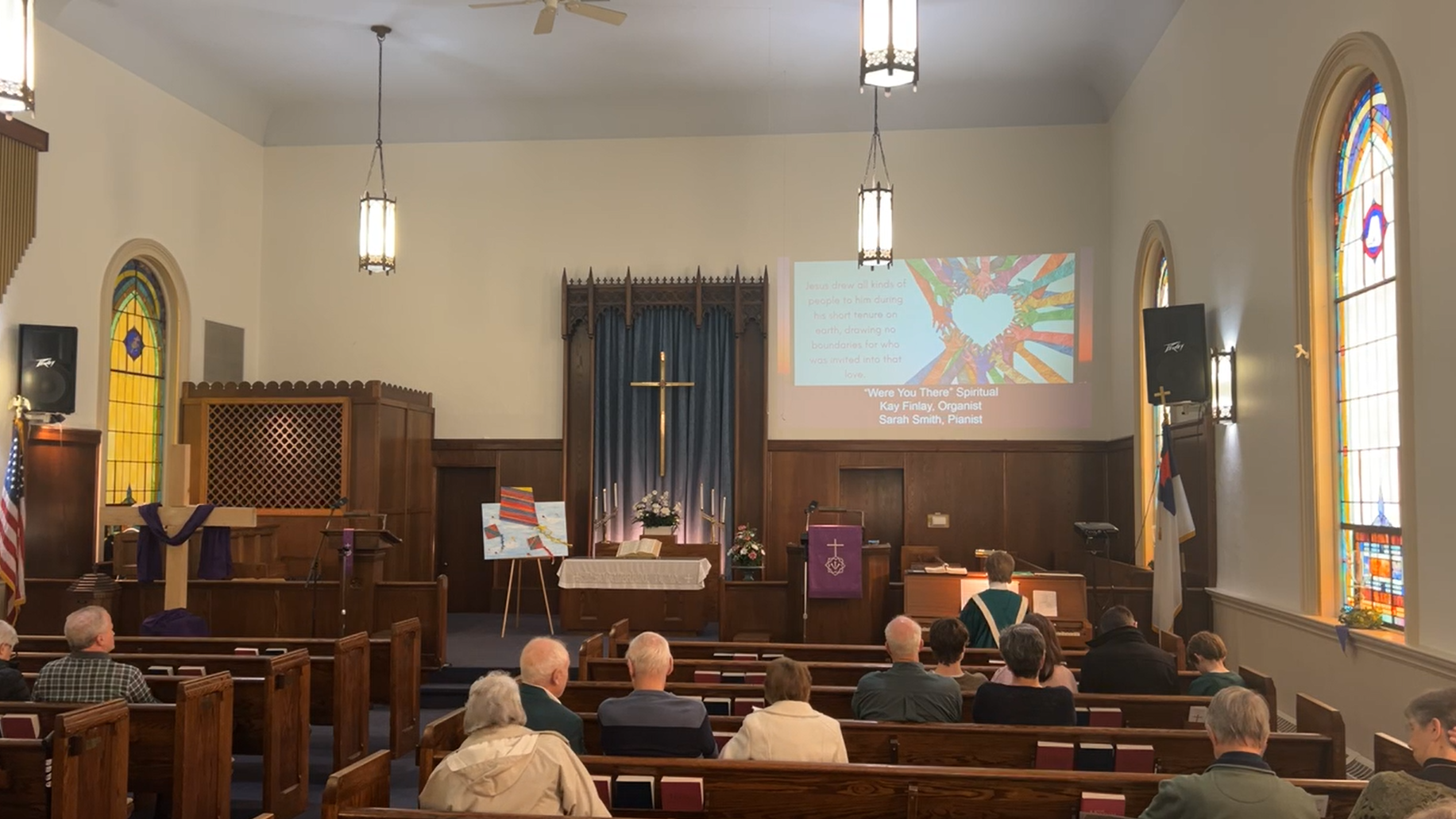
The miracle of the raising of Lazarus, is the climax of John's "signs". It explains the crowds seeking Jesus on Palm Sunday, and leads directly to the decision of Caiaphas and the Sanhedrin to plan to kill Jesus. Some theologians view the raising of Lazarus as a "pivotal miracle" which starts the chain of events that leads to the Crucifixion of Jesus.

As humans, we find all sorts of things in our lives to crown as king, but they’re often things that carry us away from the path God sets before us. On Palm Sunday, the people of Jerusalem looked to Jesus as a new king, not realizing that the crown he would bear would be made of thorns. As we celebrate his triumphal entry, as we declare him King of our lives, are we prepared to truly focus our hearts on Jesus?
Browse all of the Sermons and Messages
We learned from Katie that the Appalachian Trail, the longest pedestrian-only path in the world, winds 2,190 miles through 14 eastern states. The average walking pace once a person gets their trail legs is about three miles an hour. It takes most hikers 5-7 months to complete a thru-hike. I am sharing this with you to give a reference to think about.
Knowing about Jesus is one thing, experiencing Jesus and following him is another. Jesus calls us to many tasks, yet there is one compelling vision. Jesus calls us to a world of peace with all people being at one with God through Jesus’ grace and mercy.
Jesus said to her, "Woman, why are you weeping?" (John 20:15). Sometimes we forget. We focus so much on the joy and celebration of this day, on the bright flowers and festive music that sometimes we forget. "The first sound heard on that first Easter Sunday was the sound of weeping."
Today we start our sixth and last week of our Lenten Study of the Lord’s Prayer. Why did we spend six weeks on these small utterances of Jesus? This is the only time Jesus gives us word for word what to pray. Jesus says, "pray like this."
We have talked about the first four utterances of the Lord’s Prayer. “Our Father, who art in heaven, hollowed be they name. Thy kingdom come, thy will be done, on earth as it is in heaven. Give us this day our daily bread. Forgive us our trespasses as we forgive those who trespass against us…”
Today we start our third week of our Lenten Study of the Lord’s Prayer. Why spend six weeks on these small utterances of Jesus? This is the only time Jesus gives us word for word what to pray. Jesus says, “pray like this.” Thank you for coming today. If you have been invited to worship this morning, my gratitude goes out to you and the one who invited you.
Today we start our second week of our Lenten Study of the Lord’s Prayer. Why spend six weeks on these small utterances of Jesus? This is the only time Jesus gives us word for word what to pray. Jesus says, “pray like this.” For some of us, this will be like peeling an onion, we will peel back the layers of the prayer to find the deep meanings. For some of us, this will be a reminder of what we know. For some of us, this will be exploring new territory and perhaps creating a new practice.
Today we begin our Lenten Study of the Lord’s Prayer. Why spend six weeks on these small utterances of Jesus? This is the only time Jesus gives us word for word what to pray. Jesus says, “pray like this.” For some of us, this will be like peeling an onion, we will peel back the layers of the prayer to find the deep meanings.
Now about eight days after these sayings Jesus took with him Peter and John and James and went up on the mountain to pray. And while he was praying, the appearance of his face changed, and his clothes became dazzling white.
‘But I say to you that listen, Love your enemies, do good to those who hate you, bless those who curse you, pray for those who abuse you. If anyone strikes you on the cheek, offer the other also; and from anyone who takes away your coat do not withhold even your shirt. Give to everyone who begs from you; and if anyone takes away your goods, do not ask for them again. Do to others as you would have them do to you.
I called an audible this week. An audible is when the quarterback looks over the field and changes the offensive play based upon what he sees in the defense while standing at the line of scrimmage. I have had a few questions about the benediction that I often use. I want to share with you regarding this simple benediction rather than the sermon I had thought that I would prepare for today.
There is timing of an Epic Life. In Jeremiah 29:11, the prophet of God writes, “‘For I know the plans I have for you,’ declares the LORD, ‘plans to prosper you and not to harm you, plans to give you hope and a future.’”
I love “love” when it looks like a young couple walking hand in hand at the county fair. I love “love” when I see a mom holding a newborn baby. I love “love” when I see teachers engaging students in new learning. I love “love” when I see people donating time to serve a meal. I love “love” when I see a couple married for fifty years holding hands not to steady themselves but because they genuinely love each other.
Like the people in the days of Elijah, we, too, have a thirst. We thirst for water during the heat of the afternoon. We thirst for companions in the lonely hours of the night. We thirst for wholeness in the presence of disease. We thirst for peace in a world of strife.
When Jesus intrudes into our world, things happen. Our time is miraculously transformed into God’s time, the eternal breaks into the temporal, and the glory of God breaks forth into our world. Jesus gets invited to a wedding. Think of the scripture reading something like this, “Three days after this there was a wedding in Old Tip Town of Marshall County.”
Franciscan Health announced a baby born as the clock struck midnight on New Year’s Eve. He is 6 pounds 10.5 ounces and 20 inches long and born to Alisha and Drew Eggers of Trafalgar. What would you name such a child – Atticus.
This morning I am thinking about music other than the sweet cords and melodies of Christmas. Think back to 1978 when the British Rock Band the Who
sang a song that echoes the words of the story from the Gospel of John, “Who are you?”
There’s something about those minor keyed hymns during Advent. I love them, I want to sing ALL of the Advent minor keyed hymns, but there aren’t enough Sundays and—not one congregation I’ve served has had the patience to make it all the way to Christmas Eve before singing a Christmas Carol or two…or more.
Advent is a season of preparation. At home, people are cleaning, getting out their Christmas decorations and putting up their trees, figuring out what holiday foods to fix, figuring out how to “do” Christmas at this point in the pandemic where things look good for a few days, and then they don’t.
In my years of ministry, I’ve been honored to serve 2 churches who took on major building projects where I was able to be a part of the dreaming, planning, building and living into the finished result.
Scott and I have been packing, filling boxes and doing our best to be ready when the movers arrive. (Since he’s been off preaching at another church for the last 6 weeks, I am again admitting to God and you and everybody that Scott has done the lion-share of that work and I want him to know that I’ve told you that, and am not taking even half credit for all the work he’s done).
I know, it’s an odd text for today, isn’t it? Not one we would expect on the Sunday before Thanksgiving, as we’re thinking ahead to Advent and beginning our preparations for Christmas. We’re thinking about giving thanks. Maybe we’re thinking Baby Jesus. But today’s scripture takes us to one of the last conversations Jesus will have before he’s crucified.
Troubled Israel, as the books of Samuel begins, is waiting. Israel is portrayed as a marginal community. Threatened externally by the power and the pressure of the Philistines, Israel is politically weak and economically disadvantaged. But there is also an internal, moral and spiritual dimension to Israel’s trouble. By the end of the book of Judges, Israel is shown to be a community in moral chaos, engaged in brutality, and betrayed by undisciplined religion.
As Scott and I were raising our three children, we equally encouraged each of them, telling them that they could be and do whatever they wanted to be and do, as long as they were willing to work for it, and to give their best effort. Doing this, they would succeed.


